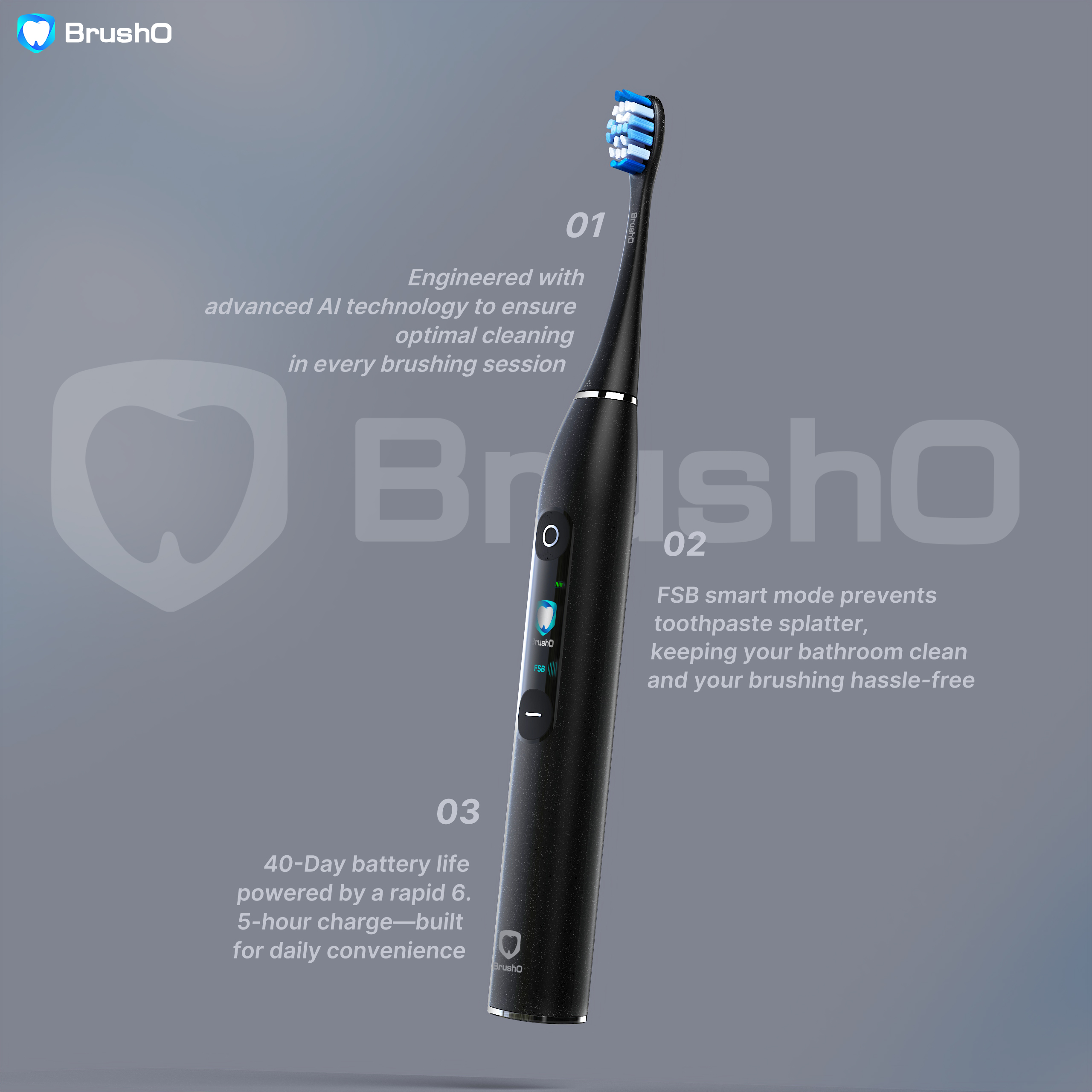Popular
How to Build the Perfect Oral Care Routine in 2025
Jul 30
Why Your Gums Bleed and How to Fix It Fast in 2025
Jul 30
Top 5 Oral Care Mistakes You are Probably Making And How BrushO Fixes Them
Jul 29
What Makes a Toothbrush “Smart”?
Jul 22
BrushO Smart Toothbrush: Gentle, Powerful, Travel-Friendly
Jul 19
BrushO: The Future of Smart Oral Care—Redefining the Way You Brush
Jul 17
Back
The Truth About Gum BleedingJul 25
Jul 25
Bleeding gums are often the body’s way of telling you something’s wrong with your oral health. In this guide, we’ll dive into the real causes behind bleeding gums, the fastest and most effective ways to stop it, and how a better brushing routine—especially with the right electric toothbrush—can make all the difference.

Why Are My Gums Bleeding?
Let’s get straight to it—bleeding gums are not normal. Even if it happens only occasionally, it shouldn't be ignored. Common causes include:
1. Poor Oral Hygiene
Inadequate brushing and flossing allow plaque—a sticky film of bacteria—to build up along the gumline. This leads to inflammation (gingivitis), which is the number one cause of gum bleeding.
2. Brushing Too Hard
Ironically, being “too enthusiastic” with brushing can hurt your gums. Using a manual toothbrush with stiff bristles or applying excessive pressure irritates the delicate gum tissue.
3. Gum Disease
If gingivitis is left untreated, it can progress to periodontitis, a more serious form of gum disease that damages the supporting structures of your teeth—and leads to persistent bleeding.
4. Vitamin Deficiencies
Lack of vitamin C or K can weaken blood vessels, making your gums more likely to bleed during brushing.
5. Hormonal Changes
Pregnancy, menopause, or menstruation can increase blood flow to the gums, making them more sensitive and prone to bleeding.
6. Other Medical Factors
Certain medications (like blood thinners), diabetes, or systemic conditions may also contribute to bleeding gums.
How to Stop Bleeding Gums—Fast and Effectively
If you’re dealing with bleeding gums, don’t panic. Here are proven ways to address it:
✅ Improve Oral Hygiene (But Gently!)
-
Brush twice a day for at least 2 minutes.
-
Floss daily to remove plaque between teeth.
-
Use a soft-bristled or electric toothbrush specifically designed for gum care.
✅ Switch to an Electric Toothbrush
Electric toothbrushes are not just about convenience—they're clinically proven to remove more plaque and reduce gum inflammation more effectively than manual brushes.
A smart electric toothbrush, like BrushO, offers features that help:
-
Prevent overbrushing with built-in pressure sensors.
-
Guide brushing technique with real-time feedback and app support.
-
Include Gum Care Mode to gently massage and stimulate gum tissue.
These features make it easier to clean thoroughly without causing further trauma to sensitive gums.
✅ Rinse with an Antibacterial Mouthwash
An alcohol-free, anti-gingivitis mouthwash can reduce bacteria in the mouth and help speed up healing.
✅ Watch Your Diet
Add more vitamin C-rich foods (like citrus, bell peppers, and strawberries) and leafy greens to your diet. Staying hydrated also supports healthy gum tissue.
✅ Book a Dental Checkup
If bleeding persists for more than a week, or you notice swelling, pus, or loose teeth, consult your dentist right away. You might be dealing with advanced gum disease.
How Can BrushO Help Prevent Gum Bleeding?
BrushO Smart Toothbrush is designed to protect your gums, not just clean your teeth. Here’s how it helps:
-
Fully Smart Brushing (FSB): Monitors your pressure and adjusts in real-time.
-
Ultra-Soft Bristles: Glide gently across your gums without scratching or tearing.
-
Gum Care Mode: Targets inflammation with micro-pulses for better circulation.
-
Leakage-Free Waterproofing (IPX7): Safe to use even in the shower.
-
Long Battery Life: Charge once and brush for up to 40 days.
When it comes to preventing bleeding gums, the right tool makes all the difference.
Can Gum Bleeding Be Reversed?
Yes—if caught early. Mild gum inflammation (gingivitis) is fully reversible with consistent care. That means:
-
Use a gentle, effective toothbrush.
-
Stick to a twice-daily brushing and flossing routine.
-
Avoid tobacco and sugary foods.
-
See your dentist regularly.
Within a week or two of improved care, you’ll likely notice less bleeding, firmer gums, and fresher breath.
Final Thoughts
Bleeding gums are more than just an inconvenience—they’re a red flag for poor gum health. But the good news is, with the right knowledge and tools, you can stop it quickly and prevent long-term damage.
10 Must-Know Tips for Better Oral Hygiene at Home
Jul 25
Best Electric Toothbrush for Sensitive Gums in 2025
Jul 25
Popular
How to Build the Perfect Oral Care Routine in 2025
Jul 30
Why Your Gums Bleed and How to Fix It Fast in 2025
Jul 30
Top 5 Oral Care Mistakes You are Probably Making And How BrushO Fixes Them
Jul 29
What Makes a Toothbrush “Smart”?
Jul 22
BrushO Smart Toothbrush: Gentle, Powerful, Travel-Friendly
Jul 19
BrushO: The Future of Smart Oral Care—Redefining the Way You Brush
Jul 17
